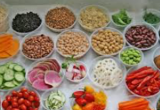How far have you gotten with your spring cleaning? Do we also need to clean out and detox our bodies along with our homes? When clients ask about eating clean and detoxing, I ask them what they mean. Some responses I’ve heard include: no toxins, raw foods, juicing, no alcohol, no caffeine, cleansing intestines, eliminating “bad” foods, etc.

I’m always curious to hear responses since no formal definition of “clean eating” exists nor is there a consensus of what one should be. However, I will share the formal definition for detoxification – “the biochemical process that transforms non-water soluble toxins and metabolites into water-soluble compounds.” Guess what happens next? The compounds get excreted in urine, sweat, bile and stool. Some of these toxins come from the environment (water, air, medications, chemicals in makeup and household products) while some come from the normal chemical reactions within our bodies.
The theory behind clean eating and detoxing is that if our body needs help getting rid of the undesirable toxins and that if it is not clean, cleansed or detoxed, it won’t be able to perform at its best. Universal goals seem to be to:
- Feel Better
- Have More Energy
- Improve Digestion
- Increase Mental Clarity
- Enhance Weight Loss
- Prevent Chronic Disease
Depending on what your definition for clean eating/detox diets is, it may call for you to go to unnecessary and extreme measures. Our bodies, specifically our lungs, liver, kidneys and gastrointestinal tract do a really great job at detoxing!
Here’s a word of caution. Be careful if you come across a diet that suggests eliminating entire food categories, like dairy, meat, grains, sugar, etc. especially when claiming they are toxic. There are plenty of untrained health experts who look to promote “their diets” for lucrative purposes, and unfortunately, many prey on cancer patients making false claims. Evaluate what the diet is asking you to do and see if the process is extreme, like fasting or suggesting to go for colonic irrigation. You can always seek help from a Registered Dietitian Nutritionist if you are unsure or would like guidance.
Many times, instead of the aforementioned desirable goals, the consequences that really result are:

- Dehydration
- Headaches
- Irritability
- Low Blood Sugar
- Anemia
- Nutrient Deficiencies
- Heart Damage
- Damage to Colon (perforation, hole)
- Lessening Your Good Gut Bacteria
Instead of anything extreme that promises a panacea, I am in favor of an overall healthier eating pattern. Even though our bodies do a good job at getting rid of undesirable substances, a healthy eating pattern will help our bodies fight the fight against obesity and chronic disease. As a nation, we do consume too much fatty, salty and sugary foods and obesity is a consequence and has been implicated as a culprit in the development of many cancers.
So what should we eat?

- Eat plenty of fruits and vegetables.
- Have whole grain options instead of refined grains.
- Consume legumes, nuts and seeds.
- Hydrate! Drink lots of water.
- Watch sodium intake.
- Limit red meat and processed foods.
- Incorporate herbs and spices into meals.
All these foods in combinations can help you look and feel your best. The current theory is that there are many substances in plant-based foods that work synergistically to help arm our bodies with disease-fighting substances. Also, follow recommendations from AICR (American Institute for Cancer Research) for cancer prevention, during treatment (*if applicable) and survivorship.
Wendy Kaplan, MS, RDN, CSO, CDCES, CDN is a registered nutritionist specializing in oncology and weight management in Long Island and in the New York City area. Connect with Wendy on Facebook, Instagram and Twitter and read more of her blog posts and download recipes at Food4HealthRD.comof her blog posts and download recipes at Food4HealthRD.com


0 Comments